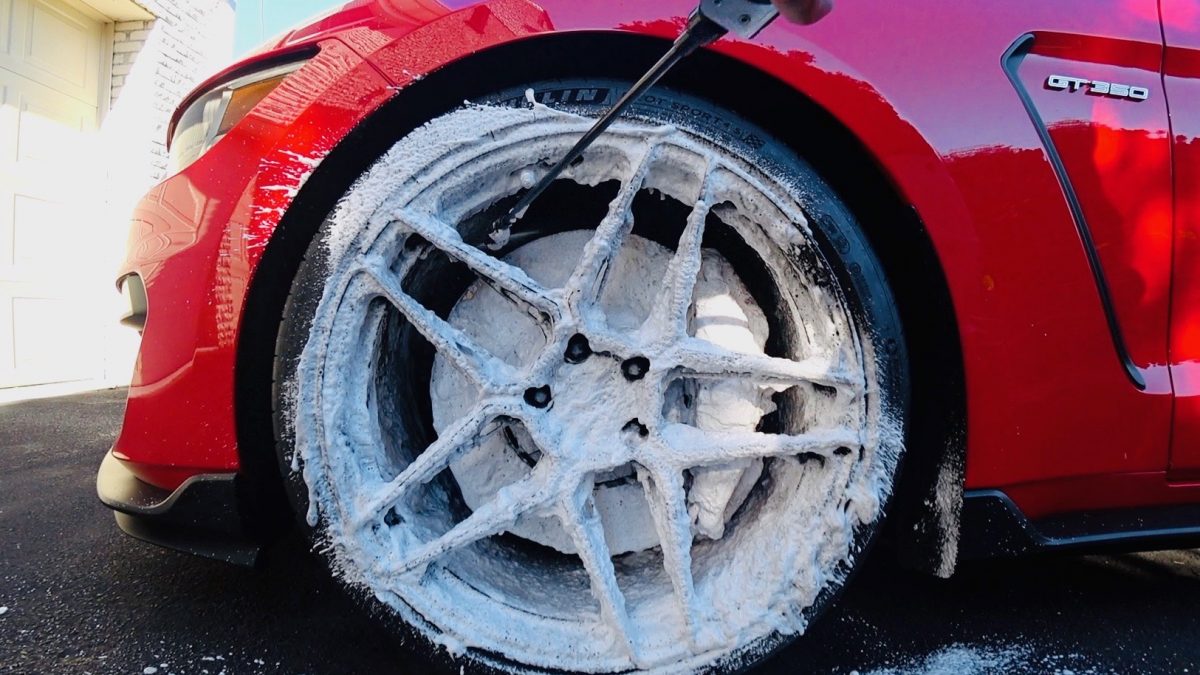
Are Wheel Cleaners Safe?
Who doesn't love a clean set of wheels and tires? With car enthusiasts chasing perfectly clean wheels, dirty wheels will most likely break your car instead of make it. This is why for years people have resorted to using wheel cleaners. However, does anyone actually know what's inside a wheel cleaner and if they should you be using them? Let's dive into why these wheel cleaners are extremely useful in cleaning wheels and see what drawbacks exist.  Although there are many different brands of wheel cleaners, they generally all follow the same formula. They tend to use a mixture of acids, ammonia-based chemicals, solvents, and water. The picture below is from a well known brand-name wheel cleaner. As you will see, this wheel cleaner contains all four common ingredients.
Although there are many different brands of wheel cleaners, they generally all follow the same formula. They tend to use a mixture of acids, ammonia-based chemicals, solvents, and water. The picture below is from a well known brand-name wheel cleaner. As you will see, this wheel cleaner contains all four common ingredients. 
 In their pure form, acids are dangerously corrosive! If you watch any movie in which acid is present, you will notice all transportation containers have label warnings. These label warnings generally include a skull and crossbones warning. If you connect one and one, then you might come to the conclusion that acids can be deadly. This is mainly due to acids dissolving and eating away at anything and everything in their path. This is both good and bad when cleaning your wheels.
In their pure form, acids are dangerously corrosive! If you watch any movie in which acid is present, you will notice all transportation containers have label warnings. These label warnings generally include a skull and crossbones warning. If you connect one and one, then you might come to the conclusion that acids can be deadly. This is mainly due to acids dissolving and eating away at anything and everything in their path. This is both good and bad when cleaning your wheels. The acids in wheel cleaners are extremely effective in dissolving any stuck on particles, road grime, brake dust, and hard water spots. This is why they have become a staple in the automotive detailing community; however, the acids in wheel cleaners are also useful in dissolving clear coats, powder finishes, and painted finishes. In addition, any runoff product can also damage tires. This is something I seriously doubt automotive detailers knew or want to occur.
The acids in wheel cleaners are extremely effective in dissolving any stuck on particles, road grime, brake dust, and hard water spots. This is why they have become a staple in the automotive detailing community; however, the acids in wheel cleaners are also useful in dissolving clear coats, powder finishes, and painted finishes. In addition, any runoff product can also damage tires. This is something I seriously doubt automotive detailers knew or want to occur.

Some of you in the automotive detailing community were aware of these hard chemicals and switched over to the other side of the PH spectrum. Did you know, however, that alkaline wheel cleaners can be just as bad acid-based wheel cleaners? Alkaline wheel cleaners use phosphates and other harmful chemicals that can be equally dangerous. These chemicals also have the potential to damage the coating on your wheels.  With the ever-increasing popularity of alloy rims, wheel manufacturers have added highly durable clear coats and resilient powder coats. Not only do these add to the gloss and "ahh" factor, but they also help create a very durable wheel finish. Although the clear coat is more durable and can withstand harsh cleaners, repeated and long term exposure can lead to damage.
With the ever-increasing popularity of alloy rims, wheel manufacturers have added highly durable clear coats and resilient powder coats. Not only do these add to the gloss and "ahh" factor, but they also help create a very durable wheel finish. Although the clear coat is more durable and can withstand harsh cleaners, repeated and long term exposure can lead to damage.

The acid and alkaline wheel cleaners are effective at dissolving road grime and brake dust. Just remember, they are also able to dissolve clear coats and the wheel itself. This is especially true if the wheel was already corroded before applying a wheel cleaner. The chemicals inside the wheel cleaner will just continue dissolving the clear coat and begin eating through the bare metal. We recommend PH neutral wheel cleaners that do not contain any acids, alkaline chemicals, nor ammonia. Should you not take our first recommendations, then we advise you only to use the product as directed and not to leave on for longer for recommended.

Leave a comment